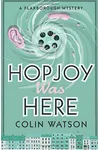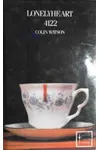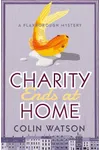Picture a British storyteller who spun witty tales of murder and mischief in a sleepy English town—meet Colin Watson! Best known for his Flaxborough Chronicles, this two-time CWA Silver Dagger winner brought mid-20th century rural England to life with a blend of dry humor, sharp social commentary, and intricate mysteries. Though his name may not ring bells today, Watson’s twelve novels remain a delightful dive into the quirks of small-town life.
Born in Croydon, Surrey, in 1920, Watson’s knack for storytelling emerged from his journalistic roots, where he observed the colorful characters of Lincolnshire. His Flaxborough, a fictional stand-in for Boston, Lincolnshire, became a stage for eccentric locals and cunning crimes, earning him a lasting place in British crime fiction.
The Making of Colin Watson
Colin Watson’s journey began in Croydon, where he was educated at Whitgift School, a historic institution founded to aid the needy. At just 17, he landed a job as a cub reporter at the Boston Guardian in Lincolnshire, a region that would inspire his fictional Flaxborough. His time as a journalist, observing the quirks and pretensions of small-town life, shaped his satirical lens. After stints in London and Newcastle-on-Tyne, Watson settled in Lincolnshire, later retiring from journalism to focus on writing and even designing silver jewelry.
Watson’s early career as a journalist gave him a front-row seat to human nature’s absurdities, which he later wove into his novels. His experiences in Lincolnshire’s market towns, filled with gossip and local power plays, fueled his ability to craft relatable yet exaggerated characters, setting the stage for his unique brand of crime fiction.
Colin Watson’s Unforgettable Stories
The Flaxborough Chronicles, a series of twelve novels, are Watson’s crowning achievement, blending cozy mysteries with biting satire. Set in the fictional town of Flaxborough, the series follows Detective Inspector Walter Purbright, a polite and principled sleuth who navigates crimes with measured enquiry. Purbright’s decency anchors the whimsical and often absurd events around him, reflecting Watson’s belief in civility as a cornerstone of society.
Key works include Coffin, Scarcely Used (1958), where Purbright investigates the suspicious death of a newspaper owner, and Lonelyheart 4122 (1967), introducing the charming conwoman Lucilla Teatime, whose whisky-sipping, domino-playing antics steal the show. Broomsticks Over Flaxborough (1972) dives into folklore and foul play, while Whatever’s Been Going On at Mumblesby? (1982) wraps the series with blackmail and quirky relics. Watson’s style—wry, character-driven, and laced with social critique—targets the pretensions of Flaxborough’s elite, revealing greed and vice beneath respectability.
His 1971 nonfiction work, Snobbery With Violence, further showcases his insight, analyzing interwar thrillers and popularizing the phrase to describe authors like Dornford Yates. Watson’s ability to balance humor with serious themes made his stories both entertaining and thought-provoking, earning him praise from critics like Julian Symons.
Why Colin Watson Matters
Colin Watson’s legacy lies in his masterful portrayal of English provincial life, exposing its underbelly with a wink. His Flaxborough Chronicles, adapted into the 1977 BBC series Murder Most English, brought characters like Purbright and Teatime to a wider audience, with Anton Rodgers and Brenda Bruce capturing their charm. Watson’s satire, targeting social pretensions and the universal motive of money, resonates beyond its era, offering timeless commentary on human nature.
Though less celebrated today, Watson’s influence endures in the crime genre’s shift toward character-driven narratives. His two CWA Silver Daggers (1962, 1967) and induction into the Detection Club in 1970 underscore his impact. For readers, his novels remain a witty escape into a world where decency prevails, and every mystery unravels with a chuckle.
- Born: February 1, 1920, Croydon, Surrey
- Died: January 18, 1983
- Key Works: Coffin, Scarcely Used, Lonelyheart 4122, Broomsticks Over Flaxborough
- Awards: CWA Silver Dagger (1962, 1967)
Snag Lonelyheart 4122 and dive into Colin Watson’s witty world of Flaxborough—where murder meets mischief!











